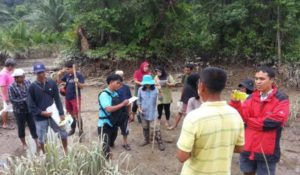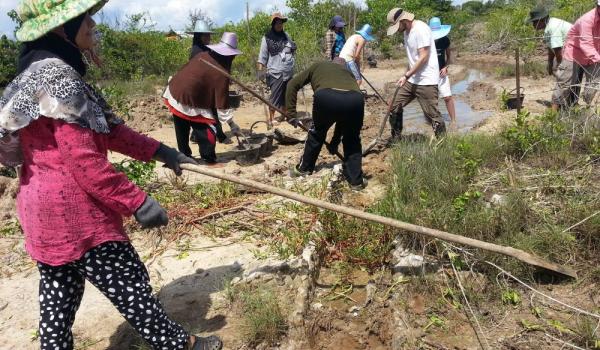Thailand has experienced a rapid loss of coastal mangroves due to a range of natural and anthropogenic factors. Shrimp aquaculture has been attributed as the largest single cause of mangrove loss in Thailand and Southeast Asia.
Clearance of mangroves has now left many coastal communities exposed to natural hazards like cyclones, storm surges, and tsunami.
 Increased salt intrusion is also affecting fresh water supplies. Currently abandoned ponds dominate large coastal areas and without the protective services of mangrove forests, the coastal communities are very vulnerable to natural hazards.
Increased salt intrusion is also affecting fresh water supplies. Currently abandoned ponds dominate large coastal areas and without the protective services of mangrove forests, the coastal communities are very vulnerable to natural hazards.
EPIC (Ecosystems Protecting Infrastructure and Communities) is implementing Community-based Ecological Mangrove Restoration (CBEMR) in two coastal sites in Thailand.
EPIC is a five year initiative that is promoting the implementation of ecosystem-based disaster risk reduction through six case studies which include (in addition to Thailand) Burkina Faso, Chile, China, Nepal, and Senegal. The project is contributing to community resilience by:
- Documenting scientific evidence;
- Building capacities to understand vulnerabilities and take action by using best practices;
- Promoting effective policies for integrated approaches to disasters, climate change and environment management.
CBEMR is a mangrove restoration technique that emerged in response to other type of restoration that have failed for example monoculture plantation of mangroves.
It is also an innovative approach to natural resource management and combines scientific research, situational analyses and local knowledge for the integration of ecological restoration, disaster risk reduction, climate change adaptation and livelihood diversification.
There are 3 key lessons from EPIC’s effective ecosystem-based approaches:
- It is important to involve communities and valorise traditional knowledge to identifylocal strategies to cope with extreme events;
- Science and research is an important in informing and guiding effective strategies;
- To ensure scaling up of ecosystem-based approaches to risks, it is important to work with authorities to inform and influence policy at local and national levels.
The project is funded by Germany’s Federal Ministry of the Environment, Nature Conservation and Nuclear Safety’s International Climate Initiative.
It is co-ordinated by IUCN that is working closely with the University of Lausanne in Switzerland, l’Institut National de la Recherche Agronomique in France, the Mangrove Action Project (MAP) in Thailand, and the Swiss Federal Institute for Forest, Snow and Landscape Research.
All photos courtesy of MAP.

